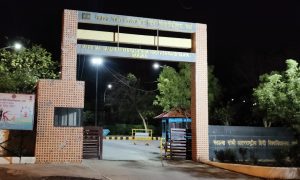The World Health Organization (WHO) estimates that over 90 million Indians or 7.5% of the population, suffer from mental health issues. It also says that mental illness makes about 15% of the total disease conditions around the world. ‘The United States National Library of Medicine’- the world’s largest medical library operating under the United States federal government, goes a step further, estimating that 14.3% of deaths worldwide, or approximately 8 million deaths each year are attributable to mental disorders. According to India’s latest National Mental Health Survey 2015-16, an estimated 150 million people across the country are in the need of mental health care interventions.
Similarly, Government of India’s National Health Mission estimates that six to seven percent of population suffers from mental disorders. And as per the National Mental Health Survey 2016, conducted in 12 States of the country by National Institute of Mental Health and Neuro Sciences, Bengaluru, the prevalence of depressive disorders among adults (18+ years) in India is estimated to be 2.7%.
Disquieting estimations and Covid-19
These estimates are enough to understand the severity of the situation. There is little denying the fact that mental health is increasingly being challenged and Covid-19 has aggravated the situation like never before. World-wide pandemic-induced job losses, lack of social contact and anxiety have been some of the factors that have led to a sharp increase in mental health cases. Mental health problems are also both a cause and consequence of several kinds of disorders, non-communicable diseases, addiction problems, injury and violence, social problems and are also linked to social determinants of health also.
Importance of mental health
Emotional and mental health is important because it’s a vital part of our life. Being healthy emotionally promotes productivity and effectiveness and plays an important part in maintaining relationships. It also allows us to adapt to changes in life which are rapid in this technology driven age and life. Good mental health helps us cope up with adversity which no one could ever predict as to when it happens. It also impacts how we feel, think and behave in different situations. However, global burden of mental health is considered to be well beyond the treatment capacities of developed and developing countries. Its social and economic ramifications are also extremely precarious. Hence, the rising social and economic costs of mental illness have forced the establishments across the globe to promote mental health as well as preventing and treating mental illnesses.
Initiatives of Government
Recognising the impact of the covid-19 pandemic on not just people’s physical but also psychological and emotional health, the Government of India has announced a number of measures including a ‘National Tele Mental Health’ programme in this year’s Budget (2022-23). Realizing the impact that COVID-19 may have on the mental health of the people, the government has ramped up its initiatives, including setting up of a 24/7 helpline to provide psycho-social support by mental health professionals to the entire affected population divided into different target groups like- children, adult, elderly, women and healthcare workers. Guidelines/ advisories on management of mental health issues, catering to different segments of the society are also issued.
National Mental Health Programme
For providing affordable and accessible mental healthcare facilities to the population, the Government is implementing the National Mental Health Programme (NMHP) in the country. The District Mental Health Programme (DMHP), a part of the NMHP, has been sanctioned for implementation in 704 districts, for which support is provided to states/UTs through the National Health Mission. Facilities made available under DMHP at the Community Health Centre (CHC) and Primary Health Centre (PHC) levels include outpatient services, assessment, counseling/ psycho-social interventions, care and support to persons with severe mental disorders, drugs, outreach services, ambulance services etc. In addition to above services, there is a provision of 10 bedded in-patient facility at the district level.
District Mental Health Programme
The District Mental Health Programme (DMHP) has been extended to 692 districts of the country, under which, enhanced financial assistance of upto Rs. 83.20 lakhs per district per year is being provided to the districts for detection, management and treatment of mental disorders/ illness and additional components like suicide prevention services, work place stress management, life skills training and counseling in schools and colleges, etc.
Three mental health institutions, namely- National Institute of Mental Health and Neuro Sciences (NIMHANS), Bengaluru, Lokopriya Gopinath Bordoloi Regional Institute of Mental Health (LGBRIMH), Tezpur, Assam and Central Institute of Psychiatry (CIP), Ranchi, under the administrative control of the central government, have been allocated funds.
Information, Education & Communication
To generate awareness among masses about mental illnesses- Information, Education and Communication (IEC) activities are an integral part of the NMHP. At the District level, sufficient funds are provided to districts under the DMHP, which comes under the non-communicable diseases flexi-pool of National Health Mission for IEC and awareness generation activities in the community, schools, workplaces, with community involvement. Under the DMHP, various IEC activities such as awareness messages in local newspapers and radio, street plays, wall paintings etc. are undertaken by the states/UTs.
Environment of support and care for all
Besides, advocacy through various media platforms in the form of creative and audio-visual materials on managing stress and anxiety and promoting an environment of support and care for all, are being ensured. Detailed guidelines by the National Institute of Mental Health and Neurosciences (NIMHANS), Bengaluru, namely- ‘Mental health in the times of COVID-19 pandemic – guidance for general medical and specialized mental health care settings’, are issued and disseminated.
Mental illness is not a stigma
All the guidelines, advisories and advocacy material can be accessed on Ministry of Health and Family Welfare website under “Behavioral Health – Psycho-social helpline” (https://www.mohfw.gov.in/). In the end we also need to avoid the stigma of mental illness as this stigma still exists all around the globe, however it is significantly less in Europe, US and some of the developed countries because of the awareness programmes and the scientific bent of mind. However, in several parts of Asia and Africa the stigma still continues. People need to think that psychiatric or other mental health problem are health problems and they also need proper treatment as others. These problems must not be taken differently.
























 WhatsApp us
WhatsApp us
Pingback: SpytoStyle.Com
Pingback: future university
Pingback: future university egypt
Pingback: fue
Pingback: جامعة المستقبل
Pingback: future university egypt
Pingback: future university
Pingback: fue
Pingback: جامعة المستقبل
Pingback: future university
Pingback: جامعة المستقبل
Pingback: Pencil Packing Job
Pingback: future university
Pingback: جامعة المستقبل
Pingback: جامعة المستقبل
Pingback: fue
Pingback: جامعة المستقبل
Pingback: exipure order
Pingback: appareils de muscu
Pingback: chat ave
Pingback: reputation defenders
Pingback: fue
Pingback: future university
Pingback: جامعة المستقبل
Pingback: fue
Pingback: Madelyn Monroe MILF
Pingback: buy-domains
Pingback: Homework help online
Pingback: valentines gift
Pingback: valentine gift
Pingback: organic bee sting
Pingback: Click Here
Pingback: Click Here
Pingback: Click Here
Pingback: Click Here
Pingback: Click Here
Pingback: Click Here
Pingback: Click Here
Pingback: Click Here
Pingback: Click Here
Pingback: Click Here
Pingback: robotics case study
Pingback: Click Here
Pingback: robots remote control
Pingback: Click Here
Pingback: Click Here
Pingback: Reputation Defenders
Pingback: Click Here
Pingback: Click Here
Pingback: Click Here
Pingback: Click Here
Pingback: Click Here
Pingback: Click Here
Pingback: Click Here
Pingback: Click Here
Pingback: Click Here
Pingback: Click Here
Pingback: Click Here
Pingback: Click Here
Pingback: Click Here
Pingback: Click Here
Pingback: Click Here
Pingback: grand rapids dentist
Pingback: Click Here
Pingback: https://gquery.org/
Pingback: Click Here
Pingback: Click Here
Pingback: Click Here
Pingback: Click Here
Pingback: Click Here
Pingback: Click Here
Pingback: Click Here
Pingback: Click Here
Pingback: Click Here
Pingback: Click Here
Pingback: Click Here
Pingback: Click Here
Pingback: Click Here
Pingback: Click Here
Pingback: Click Here
Pingback: Click Here
Pingback: Click Here
Pingback: Click Here
Pingback: Click Here
Pingback: Click Here
Pingback: 카지노 게임 플레이
Pingback: buy-domains
Pingback: top startup books
Pingback: Google reviews
Pingback: How to start OnlyFans Australia
Pingback: reputation defenders
Pingback: 2023 Books
Pingback: obituaries
Pingback: online memorial
Pingback: search dececased
Pingback: bet of the day
Pingback: Chirurgiens esthétique Tunisie
Pingback: National Chi Nan University
Pingback: احسن جامعه فى مصر
Pingback: Admissions process
Pingback: Admission Process
Pingback: كلية التجارة وإدارة الأعمال
Pingback: Faculty of Commerce and Business Administration
Pingback: رسالة كلية الاقتصاد والعلوم السياسية
Pingback: Pharmacy Practice and Clinical Pharmacy
Pingback: بكالوريوس فى طب الفم والاسنان
Pingback: student projects
Pingback: distance education
Pingback: fue
Pingback: برامج الدراسات العليا في جامعة المستقبل
Pingback: MBA scholarships in Egypt
Pingback: Business administration program Egypt
Pingback: Research Activities for pharmacy students at future university
Pingback: Teeth whitening
Pingback: Engineering Excellence
Pingback: ????? ??????????
Pingback: Online Education
Pingback: digital press
Pingback: Forum of Future Policies
Pingback: professional skills development
Pingback: Biochemistry
Pingback: https://www.kooky.domains/post/the-importance-of-dns-in-web3-domain-management
Pingback: https://www.kooky.domains/post/increased-security-measures-with-web3-domains
Pingback: MBA scholarships in Egypt
Pingback: Politics
Pingback: دورات زراعة الأسنان
Pingback: Maillot de football
Pingback: strisce luminose per scale
Pingback: fiverrearn.com
Pingback: flatbed broker
Pingback: french bulldog puppies
Pingback: Top university in Egypt
Pingback: isla mujeres photographer
Pingback: cream french bulldog
Pingback: bewerto
Pingback: french bulldogs in texas for sale
Pingback: tridelta hat
Pingback: puppy french bulldogs for sale
Pingback: fue
Pingback: Secure piano transport
Pingback: Piano moving and storage
Pingback: Piano tuning and maintenance
Pingback: Furniture disassembly
Pingback: MB Removals
Pingback: Moving consultation
Pingback: Entrepreneurship and innovation programs in Egypt
Pingback: Coach
Pingback: Pupuk terbaik dan terpercaya hanya melalui pupukanorganik.com
Pingback: partners
Pingback: مميزات كلية الصيدلة
Pingback: live sex cams
Pingback: live sex cams
Pingback: french bulldog
Pingback: Queen Arwa University
Pingback: Scientific Research
Pingback: Kampus Islam Terbaik
Pingback: FiverrEarn
Pingback: FiverrEarn
Pingback: FiverrEarn
Pingback: FiverrEarn
Pingback: FiverrEarn
Pingback: Generator Sales Manchester
Pingback: cheap sex cams
Pingback: live sex cams
Pingback: live sex cams
Pingback: live sex cams
Pingback: live sex cams
Pingback: frt trigger
Pingback: 늑대닷컴
Pingback: Turnamen slot
Pingback: nangs sydney
Pingback: mobile app development Singapore
Pingback: allgame
Pingback: 918kiss
Pingback: หวย24
Pingback: Cosmetics
Pingback: pg slot
Pingback: slot online Indonesia
Pingback: east wind spa and hotel
Pingback: hotel in lake placid
Pingback: duromine
Pingback: 17 wsm
Pingback: ingénieur informaticien
Pingback: catégories de logiciels malveillants
Pingback: catégorie de logiciel malveillant
Pingback: quick nangs delivery
Pingback: itsmasum.com
Pingback: chat ib
Pingback: itsmasum.com
Pingback: itsmasum.com
Pingback: europe jobs career